EPINEPHRINE AUTO-INJECTOR - INJECTION
PHONETIC PRONUNCIATION: (ep-in-EFF-rin)
COMMON BRAND NAME(S): Auvi-Q, Epipen, Twinject
GENERIC NAME(S): epinephrine
Uses
USES: This medication is used in emergencies to treat very serious allergic reactions to insect stings/bites, foods, drugs, or other substances. Epinephrine acts quickly to improve breathing, stimulate the heart, raise a dropping blood pressure, reverse hives, and reduce swelling of the face, lips, and throat.
How to use EPINEPHRINE AUTO-INJECTOR - INJECTION
HOW TO USE: Keep this product near you at all times. (See also Storage section). Different brands of this medication have different directions for preparing and using the injector. Learn how to properly inject this medication in advance so you will be prepared when you actually need to use it. Also teach a family member or caregiver what to do if you cannot inject the medication yourself. For infants and children, make sure to hold their leg in place before and during the injection of the medication to prevent injuries from occurring. Read the Patient Information Leaflet provided by your pharmacist before you have to use epinephrine and each time you get a refill. If you have any questions, consult your doctor or pharmacist. The effects of this medication are rapid but not long-lasting. After injecting epinephrine, get medical help right away. Tell the healthcare professional that you have given yourself an injection of epinephrine. Avoid injecting this medication into your hands, feet, buttocks, or areas of your body other than the thigh. If this occurs, tell the healthcare professional right away. Discard the injector properly. The solution in this product should be clear. Check this product visually for particles or discoloration from time to time. If it has turned cloudy or pink/brown in color, do not use the product. Obtain a new supply.
Side Effects
Precautions
Interactions
Overdose
Images
Reviews
Faq for EPINEPHRINE AUTO-INJECTOR - INJECTION
An epinephrine auto-injector is a device used to treat severe allergic reactions, also known as anaphylaxis. It delivers a single dose of epinephrine (adrenaline) to the body quickly and easily.
Carrying an epinephrine auto-injector is crucial for individuals with known severe allergies, as it can be a life-saving tool in case of an allergic reaction. It helps to quickly reverse the symptoms of anaphylaxis until medical help arrives.
Anyone with a known severe allergy, especially those who have experienced anaphylaxis in the past, should carry an epinephrine auto-injector. This includes individuals with allergies to food, insect stings, medications, or latex.
To use an epinephrine auto-injector, remove the safety cap, firmly press the auto-injector against the outer thigh, and hold it in place for a few seconds. Afterward, seek immediate medical attention. It is important to follow the specific instructions provided with your auto-injector.
Yes, if someone is experiencing a severe allergic reaction and is unable to use their own epinephrine auto-injector, it is safe and appropriate to administer it on their behalf. However, always call emergency services and inform healthcare professionals afterwards.
The effects of an epinephrine auto-injector typically last for about 10-20 minutes. However, it varies from person to person, and additional doses or medical assistance may be required.
No, an epinephrine auto-injector is designed for single-use only. After use, it should be discarded following the specific instructions provided by the manufacturer or healthcare professional.
While rare, some common side effects of using an epinephrine auto-injector may include increased heart rate, palpitations, nervousness, headache, and nausea. These side effects usually subside quickly. It is important to seek medical attention after using the device.
Yes, epinephrine auto-injectors have an expiration date printed on them. It is crucial to regularly check and replace them before they expire to ensure their effectiveness in case of an emergency.
Disclaimer
IMPORTANT: HOW TO USE THIS INFORMATION: This is a summary and does NOT have all possible information about this product. This information does not assure that this product is safe, effective, or appropriate for you. This information is not individual medical advice and does not substitute for the advice of your health care professional. Always ask your health care professional for complete information about this product and your specific health needs.
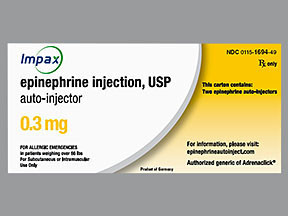
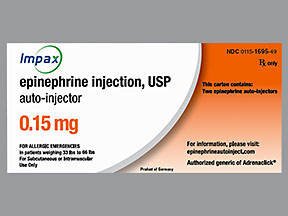
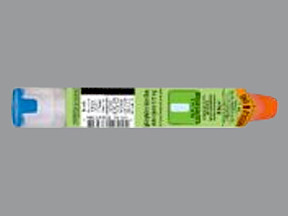
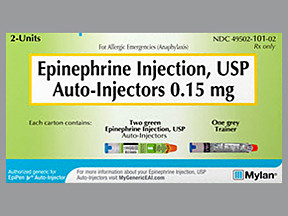
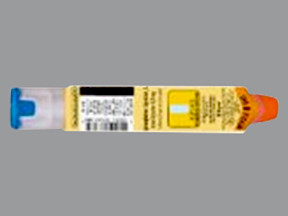
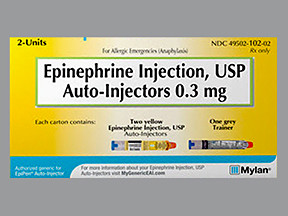
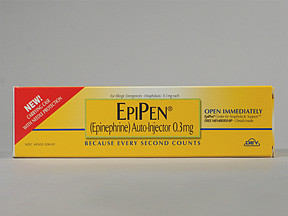
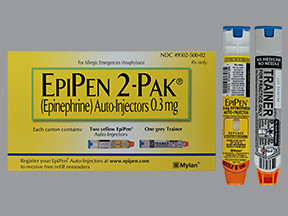
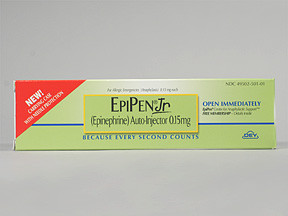
No Reviews Yet